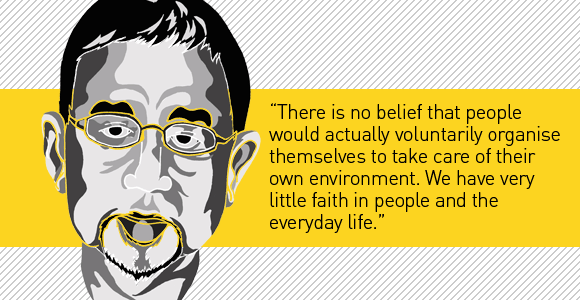Expert
Chua Beng Huat
on “equal suffering” in the public housing space and nostalgia for the kampung

Graphic by FIRDIANA FAWZIR
An urban sociologist at the National University of Singapore, Professor Chua has tapped his experience as the former Director of Research at the Housing and Development Board (HDB) and written extensively on the public housing environment in Singapore.
Elderly people here often complain about the public housing environment, what’s wrong?
The environment is miserable for older people because you are confined to the flat or you just go downstairs. It’s a very harsh environment that has no activities other than sit around and you can’t do anything. For the children, they provide playgrounds, for people more active, there is a running track and swimming pool, but generally speaking, it does not provide for the aged other than community centre activities… boring as hell to go, it’s just going from one concrete environment to another, and sometimes the activities are infantile.
Who is the public housing environment planned for then?
I think our urban planners basically plan for nobody except children, and even then, pretty miserably. If you’re 18 years old, what do you do in a HDB housing estate? They assume people take care of themselves and for children it is just a playground in every eight blocks they are now all artificial, soft spongy grounds. They actually don’t want you to wreck the grass, it’s pretty miserable! About the only community things, if it’s not in the community centre, is actually people just sitting around and talking to each other and those tend to be housewives and the aged.
Perhaps we should return to the kampung and the good old days?
I always think people over-romanticise about the kampung because they never lived in one and it is just nostalgia in the bad sense. There was fairly serious unemployment then, so people had a lot of time. Most who lived in the kampung actually worked in the city but the work is very irregular so they have a lot of time hanging out in the kampung but it is not a particularly active life. You are not in a hurry to go to work or stressed by labour or stuff like that. There is nothing else to do but watch fighting fish in a jar or sit around and drink coffee and talk nonsense. So it’s fairly relaxed but not necessarily active, and it is relaxed not because of anything other than the fact that there is no employment.
What about the lack of community spirit in the public housing environment?
I think that’s the biggest question the HDB has continuously worried about. Two things you have to realise, not everyone needs this local community cause people have it away from home, particularly working people. And, only people who are stuck in the public housing environment need local community. Children, housewives and aged, those are the three groups that need local community, but they are all very different kind of needs. I think it’s not so much the HDB, but other kind of organisations that will have to think up what to do.
Why has it been so difficult for local community to grow in the HDB environment?
There is no belief that people would actually voluntarily organise themselves to take care of their own environment. We have very little faith in people and the everyday life. There are ton of workers taking care all of that so residents have no responsibility to anything, there is no sort of mechanism to generate community unless you become member of the Residents’ Committee and community centre. Whenever community is generated, it’s an occasional thing, mooncake festival and this kind of thing, it’s very event-oriented rather than everyday notion of community.
How can the public housing environment be improved then?
The planners can provide space – somebody comes along and say they need that kind of space, they would probably consider it. But again, the HDB thinks if we provide in one neighbourhood, we have to provide in the whole country, which is what is totally daunting. They refuse to accept difference, because it is the cause of complaints: How come that neighbourhood has this and we don’t?
And to provide differences all the time creates a lot of administrative work, so it is easy to pretend that you believe in equality – we can’t provide for you because, if we do for you we have to do for the rest and we can’t afford it. It is a very fundamental Singapore bureaucracy rule, always use the extreme imaginary that if one person is provided for, then everybody should be, or everybody will be clamouring to be provided for, which is absolutely false.
Another problem is each HDB block is allocated according to each family, you can never tell how many old people are in one neighbourhood, it could be zero, it could be lots. So if you notice the HDB’s planning process, it’s a very even distribution of facilities, every 8 or 10 blocks has a playground, every 25 blocks or something has a small row of shops, it’s like equal suffering or equal benefits, it doesn’t matter which way you call it.
